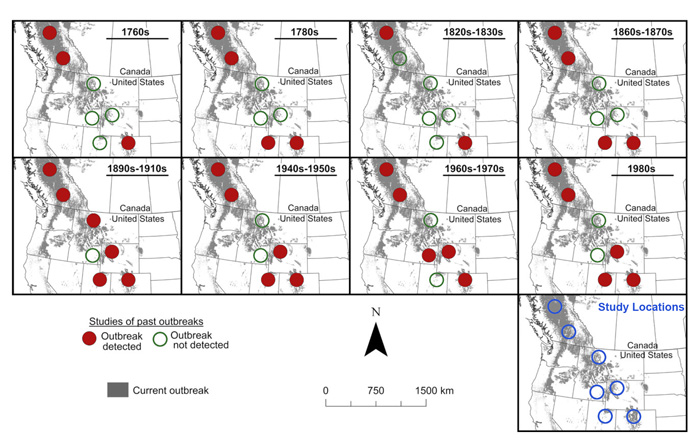| Tweet | Follow @co2science |
Paper Reviewed
Jarvis, D.S. and Kulakowski, D. 2015. Long-term history and synchrony of mountain pine beetle outbreaks in lodgepole pine forests. Journal of Biogeography 42: 1029-1039.
Introducing their work, Jarvis and Kulakowski (2015) write that "a global shift in the extent and severity of forest insect outbreaks has been attributed to climate warming," while focusing their attention on an ongoing outbreak of mountain pine beetle (MPB) in western North America, which phenomenon is said by them to be "synchronous, widespread and severe," further adding that it is also "widely believed to be unprecedented." But is this latter belief correct?
In an attempt to find out, the two U.S. researchers (1) used tree-ring methods to reconstruct a history of MPB outbreaks over the past four centuries in western Colorado and (2) compared the synchrony of these outbreaks with those that had been previously documented or reconstructed across western North America.
This work revealed, as they describe it, that "outbreaks of MPB have been part of the forest dynamics in western Colorado for centuries," and that "these findings, taken together with results from previous studies in the western United States and Canada, strongly suggest the broad-scale synchrony of several MPB outbreaks over the past three centuries across western North America" (see figure below). And these findings further suggest that there is nothing unusual, unnatural or unprecedented about the current MPB outbreak throughout this region, which further suggests that it is likely not being driven by anthropogenic-induced global warming."

Current and historical MPB outbreaks in the United States and Canada. Grey shading in each panel represents areas affected by the ongoing outbreak. Red circles represent generalized areas where historical Dendroctonus ponderosae outbreaks have been documented and reconstructed in the current study as well as in previous studies. Empty green circles indicate where MPB outbreaks were not detected historically.




